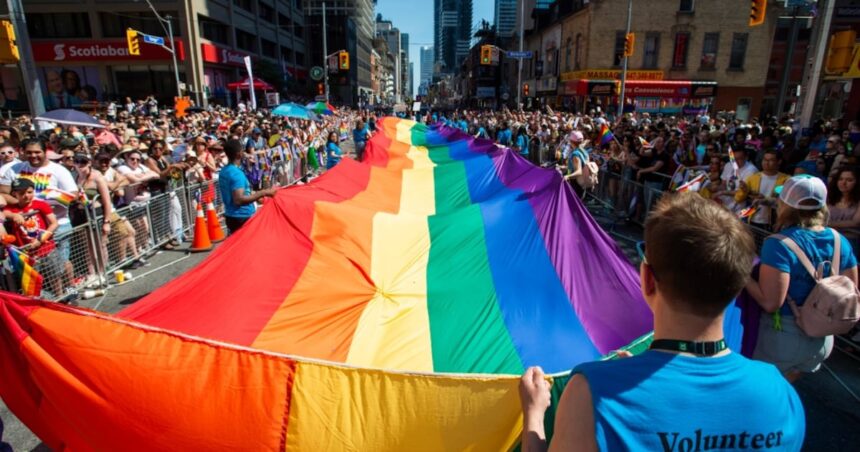In what seems like a troubling sign for Pride Toronto’s financial stability, both Google Canada and Home Depot have withdrawn their sponsorship support just weeks before the city’s signature LGBTQ+ celebration kicks off.
The timing couldn’t be more challenging for Pride Toronto, which has already been navigating serious financial headwinds. These recent sponsorship losses compound existing financial pressures for the organization that hosts one of North America’s largest Pride festivals.
I’ve been covering Toronto’s business community for nearly a decade, and these corporate sponsorship decisions often signal deeper currents in both the business landscape and cultural politics. Several sources within Toronto’s event planning community tell me this puts Pride in a particularly difficult position with limited time to secure replacement funding.
“Corporate sponsorships typically represent 30-40% of major festival budgets in Toronto,” explains Janice Hirota, a local event producer I spoke with yesterday. “Losing two major sponsors this close to the event creates significant operational challenges.”
Pride Toronto has experienced a series of financial setbacks recently. Last fall, they reported an operating deficit exceeding $700,000 – a substantial financial hole for any non-profit organization. The festival had already been forced to scale back programming and reduce staffing levels.
When I reached out to Pride Toronto’s executive office, their communications team provided a statement acknowledging the withdrawals while emphasizing their commitment to delivering a meaningful celebration.
“We remain focused on creating inclusive spaces that celebrate our diverse communities,” the statement read. “While we’re disappointed by these changes in corporate support, we’re exploring alternative partnerships.”
Neither Google Canada nor Home Depot have publicly detailed their reasons for withdrawing. However, both companies had faced internal and external pressure regarding their Pride partnerships in recent months. This pattern of corporate sponsorship volatility isn’t unique to Toronto – similar dynamics have played out in Pride celebrations across North America.
Walking through the Church-Wellesley Village yesterday afternoon, I noticed the community’s resilience despite these challenges. Local businesses were already displaying Pride decorations, and several shop owners I spoke with expressed determination to ensure the celebration succeeds regardless of corporate backing.
“The community always steps up,” said Miguel Vasquez, who owns a small café on Church Street. “This isn’t the first time Pride has faced challenges, and the grassroots support is stronger than ever.”
Pride Toronto’s festival, scheduled to run through June with the marquee parade on June 30, historically draws hundreds of thousands of visitors and generates significant economic activity for the city. Tourism Toronto estimates the economic impact typically exceeds $95 million annually.
City Councillor Kristyn Wong-Tam has previously advocated for increased municipal support for the festival, recognizing its cultural and economic significance. The city currently provides approximately $260,000 in annual funding, though this represents just a fraction of Pride’s operating budget.
Other corporate sponsors, including TD Bank and Loblaw Companies, have confirmed they’ll maintain their support this year. This continued commitment from some corporate partners offers a partial counterbalance to the recent withdrawals.
For Toronto’s LGBTQ+ community and allies, the festival remains a vital cultural institution regardless of financial challenges. Community fundraising efforts have already begun, with several local businesses launching initiatives to help close the funding gap.
What’s becoming increasingly clear is that Pride Toronto’s financial model may need reimagining. The organization’s heavy reliance on corporate sponsorships creates vulnerability when those partnerships change. Diversifying revenue streams might provide more stability in the future.
As someone who’s watched Toronto’s cultural landscape evolve over the years, I’ve seen community-driven events find creative ways to adapt and thrive. Pride Toronto’s current challenges, while significant, could potentially spark innovations in how the festival operates and funds itself going forward.
The question now is whether Pride Toronto can navigate these immediate financial pressures while developing a more sustainable model for the future. The coming weeks will be crucial as the organization finalizes plans for this year’s celebration under these new constraints.
For Toronto, the success of Pride remains important not just for the LGBTQ+ community, but as a reflection of our city’s broader values of inclusion and celebration of diversity – values that transcend corporate sponsorship decisions.







